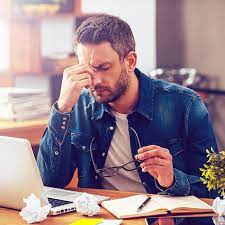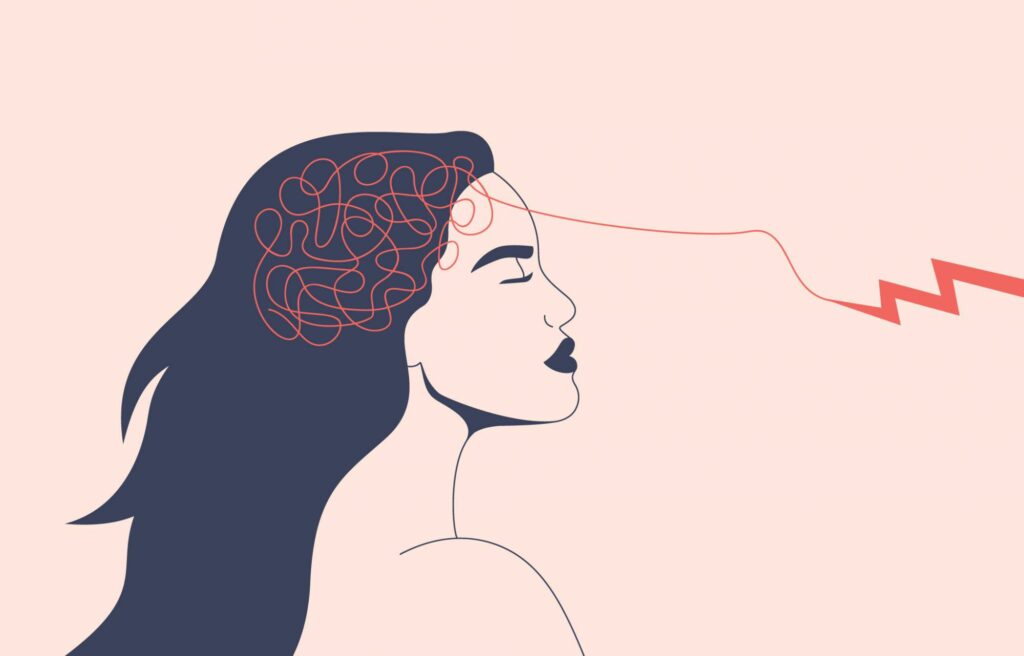Anxiety attacks are more common than you might think. In fact, almost one in five adults will experience an anxiety attack at some point in their lives. But what are anxiety attacks, exactly? And what causes them? This blog post will explore eight of the most surprising causes of anxiety attacks. If you are struggling with anxiety, it is important to be aware of all possible triggers and anxiety attack causes in order to avoid them. Keep reading to learn more!
Contents
Defining Anxiety Attacks
 Anxiety attacks are sudden, intense episodes of fear or panic that can come on without warning. These attacks can peak within minutes, and they may cause physical symptoms like a racing heart, shortness of breath, dizziness, and more.
Anxiety attacks are sudden, intense episodes of fear or panic that can come on without warning. These attacks can peak within minutes, and they may cause physical symptoms like a racing heart, shortness of breath, dizziness, and more.
Also, anxiety attacks are described as episodes of fear or panic that are so overwhelming. That they interfere with a person’s ability to function in day-to-day life. More often, it is accompanied by physical symptoms. Some of the symptoms are:
- accelerated heart rate,
- sweating,
- trembling,
- difficulty in breathing, and
- a feeling of choking.
It may also cause nausea or abdominal pain. Hot flashes or chills are sometimes experienced. The anxiety attacks are generally short-lived. But, the aftermath of the attack can last for hours or even days.
Anxiety attacks are difficult to deal with, not only because of the physical symptoms but also the mental and emotional ones. It can be hard to think clearly or function properly after an anxiety attack. You may feel drained, shaky, and unable to concentrate. You may also have trouble sleeping or feel like you’re in a state of a constant worry.
Therefore, it is important to understand the causes of anxiety attacks. Once you know the causes, you can start to work on ways to prevent them.
Top 8 Anxiety Attack Causes
There are several surprising things that can trigger an anxiety attack. Some of these triggers may be things that you would never expect. Here are eight of the most anxiety attack causes:
Family History of Mental Health Disorders
It is not uncommon for people who have a family member with a mental health disorder to experience anxiety. This is because mental health disorders tend to be hereditary. Moreover, some other mental health disorders, such as depression, can also increase the risk of anxiety.
As Anxiety attack is a mental health disorder, it can be passed down among family members. If you have a family member who suffers from anxiety or any other mental health disorder, you may be at a higher risk of suffering from anxiety attacks.
Certain Medications
 There are some medications that can cause anxiety attacks. These include:
There are some medications that can cause anxiety attacks. These include:
- beta-blockers
- antidepressants
- stimulants
- corticosteroids
The medications listed above can cause anxiety by affecting the levels of neurotransmitters in the brain. In fact, researchers have found that some of these medications can actually increase the risk of anxiety attacks.
If you are taking any of the above-mentioned medications, it is important to talk to your doctor about the possibility of anxiety attacks. Also, if you are taking any other medications, be sure to ask your doctor if they could cause anxiety.
Caffeine
Caffeine is a stimulant that can increase anxiety. Caffeine can be found in coffee, tea, soda, energy drinks, and chocolate. If you are prone to anxiety, it is best to avoid or limit your intake of caffeine. There are many decaffeinated options available, so you don’t have to give up your favorite beverages altogether.
Also, you have to understand that too much consumption of caffeine can lead to an increase in anxiety and panic attacks. If you are consuming more than 400 mg of caffeine per day, then it is time to cut down.
Anxiety Disorders
Anxiety disorders are the most common type of mental health disorder. Anxiety disorders include:
- generalized anxiety disorder
- panic disorder
- social anxiety disorder
In fact, anxiety attacks causes are often related to anxiety disorders. People with anxiety disorders are more likely to experience anxiety attacks than people without anxiety disorders. GAD and Panic Disorder are more likely to cause anxiety attacks than a social anxiety disorder.
The reason behind this is Anxiety disorders are characterized by persistent and excessive worry. So, when a person with an anxiety disorder is faced with a stressful situation, they are more likely to experience an anxiety attack.
Stressful Life Events
 Stressful life events can trigger an anxiety attack. These events can include:
Stressful life events can trigger an anxiety attack. These events can include:
- death of a loved one
- divorce
- losing a job
- moving to a new place
These life events are stressful because they represent a loss of something important or a change in your life. The stress from these events can be overwhelming and lead to an anxiety attack. In fact, studies have shown that people who experience a major life event are more likely to develop an anxiety disorder.
Substance Abuse
People who abuse drugs or alcohol are more likely to experience anxiety. This is because substances can affect the levels of neurotransmitters in the brain. Also, it is believed that people with anxiety disorders are more likely to self-medicate with drugs or alcohol.
But, using these substances can lead to more anxiety and even panic attacks. If you suffer from anxiety, it’s important to avoid substance abuse. Because this is not only harmful to your health, but it can also make your anxiety worse.
Changes in brain chemistry and hormones
This is one of the most surprising anxiety attack causes. But t is true that changes in brain chemistry and hormones can trigger anxiety. These changes can be caused by:
- pregnancy
- menopause
- thyroid problems
You may not be able to control all of the things that cause anxiety. But there are things that you can do to manage your anxiety. If you think you may be suffering from anxiety, it is important to seek help from a mental health professional after knowing all possible anxiety attack causes.
Traumatic event
Anxiety can also be caused by a traumatic event. This could be something like:
- a car accident
- natural disaster
- death in the family
Traumatic events can cause long-lasting anxiety and even post-traumatic stress disorder (PTSD). Also, it is believed that people who have experienced trauma are more likely to experience anxiety and anxiety attacks.
So, these top 8 causes of anxiety attacks can help you to identify what might be triggering your own anxiety. If you are experiencing anxiety, it is important to talk to a doctor or mental health professional. They can help you to develop a treatment plan and manage your symptoms.
Treatment Options
 There are many ways to treat anxiety and anxiety attacks. Some people may need medication to help control their anxiety. Others may need therapy or counseling to help them learn how to deal with their anxiety. Some people may need a combination of both medication and therapy.
There are many ways to treat anxiety and anxiety attacks. Some people may need medication to help control their anxiety. Others may need therapy or counseling to help them learn how to deal with their anxiety. Some people may need a combination of both medication and therapy.
Medication
This is the most common form of treatment for anxiety and anxiety attacks. Medication can help to control the symptoms of anxiety and make it easier for people to manage their condition. There are many different types of medication, such as:
- Selective serotonin reuptake inhibitors (SSRIs)
- Serotonin and norepinephrine reuptake inhibitors (SNRIs)
- Tricyclic antidepressants (TCAs)
- Benzodiazepines
The medications are often prescribed by a psychiatrist or other mental health professional. They may also be prescribed by a primary care physician.
Therapy
This is another common form of treatment for anxiety and anxiety attacks. Therapy can help people learn how to deal with their anxiety and make it more manageable. There are many different types of therapy, such as:
- Cognitive-behavioral therapy
- Exposure therapy
- Dialectical behavioral therapy
- Psychodynamic therapy
Each type of therapy has different techniques and approaches. Some people may find one type of therapy more helpful than another. It is important to talk to a therapist about what might work best for you.
Therapy can be done in individual or group sessions. Also, some people may find it helpful to see a therapist once a week, while others may only need to go every few weeks. It depends on the severity of the anxiety and how well the person is able to cope with it.
If you are considering therapy, then contact Mantra Care for the right therapist. Mantra Care has a team of expert therapists who can help you manage your anxiety and anxiety attacks. Contact us today to learn more about our services. We can help you find the right treatment for you and provide you with the support you need to cope with your anxiety. Book your free consultation now!
Tips To Manage Your Anxiety Attacks
Anxiety attack causes are varied and there are things you can do to manage your anxiety attacks.
Anxiety is a normal emotion that we all experience at one time or another. It’s what we feel when we’re confronted with a challenging situation, and it helps us stay alert and focused. However, for some people, anxiety can become so intense that it interferes with their daily lives. So, here are some tips to manage your anxiety attacks:
Identify your triggers
It is the primary step to managing your anxiety attacks. Once you know what causes your anxiety, you can work on avoidance or exposure techniques to help you cope with the trigger. Also, try to identify your early warning signs so that you can take action before the anxiety attack begins.
Deep breathing
 When we’re anxious, our breathing becomes shallow and rapid. This can make us feel even more anxious. So, take a few deep breaths and try to focus on your breath. Breathe in through your nose and out through your mouth. In fact, deep breathing is more effective when you exhale longer than you inhale. It is believed that this practice can help to lower your heart rate and blood pressure.
When we’re anxious, our breathing becomes shallow and rapid. This can make us feel even more anxious. So, take a few deep breaths and try to focus on your breath. Breathe in through your nose and out through your mouth. In fact, deep breathing is more effective when you exhale longer than you inhale. It is believed that this practice can help to lower your heart rate and blood pressure.
Visualize a calm place
Try to picture a place where you feel relaxed. It can be anywhere – a beach, a forest, or even your own home. Close your eyes and take slow, deep breaths. Visualize every detail of the place in your mind. The more realistic it is, the more effective it will be. Also, this is a great way to relax and reduce your anxiety when you can’t take a vacation. In anxiety attacks, visualization is one of the most effective techniques.
Progressive muscle relaxation
This is a technique that involves tensing and relaxing different muscle groups in your body. Start with your toes and work your way up to your head. Tense the muscle group for five seconds and then relax for 30 seconds. This will help you to focus on something other than your anxiety. More often, people with anxiety tend to focus on their racing thoughts, which can make the anxiety worse. So, progressive muscle relaxation is a great way to redirect your focus and reduce your anxiety.
Get moving
Exercise is a great way to reduce anxiety. It helps to release endorphins, which are the body’s natural stress-relievers. Even a short walk can make a difference. In fact, research has shown that regular exercise can be as effective as medication for some people. Moving is more about managing your anxiety than it is about the actual exercise. So, if you don’t like to exercise, then try something else that gets you moving, such as dancing or gardening.
Talk to someone who understands
Anxiety attacks are really distressing and it helps to talk to someone who understands what you’re going through. Sometimes, just talking about your anxiety can help to lessen its intensity. If you don’t have anyone in your life who understands, there are many online support groups that can offer help and understanding.
Stick to your treatment plan
If you are getting treatment for anxiety, it’s important to stick to your treatment plan. This may include medication, therapy, or both. Don’t skip appointments and don’t stop taking your medication without talking to your doctor first. In fact, research has shown that people who stick to their treatment plan have the best chance of recovery.
Keep a journal
 Journaling your feelings can help you to understand your anxiety better. It can also help you to see the progress you’re making as you work through your anxiety attacks. Also, it can include things that trigger your anxiety so that you can avoid them in the future. You can also express yourself through writing:
Journaling your feelings can help you to understand your anxiety better. It can also help you to see the progress you’re making as you work through your anxiety attacks. Also, it can include things that trigger your anxiety so that you can avoid them in the future. You can also express yourself through writing:
- poem,
- letter, or
- short story.
Avoid substance abuse
You should never use alcohol or drugs to self-medicate your anxiety. This can lead to addiction and make your anxiety worse in the long run. If you’re struggling with substance abuse, there is help available. And, anxiety attack causes are many, so get help if you can. It is very essential to avoid substance abuse because this makes the anxiety worse in the long term.
Be relaxed and patient
This is often the most difficult thing to do when you’re having an anxiety attack. But, it’s important to try to stay calm and relaxed. This can be difficult, but it’s important to remember that the anxiety will pass eventually. Just focus on your breathing and try to relax your body. Also, do not push yourself too hard. Take things at your own pace and be patient with yourself.
Anxiety attack causes can make your situation worse and those attacks can be very distressing. But there are many things you can do to manage them. By understanding the causes of anxiety attacks and learning some coping techniques, you can make a big difference in your life. So, don’t hesitate to get help if you need it. And, most importantly, remember that you are not alone. There are many people who understand what you’re going through and can offer support.
Conclusion
To conclude, anxiety attack causes are actually quite varied and range from the physical to the psychological. If you suffer from anxiety attacks, it is important to talk to your doctor about all of the potential causes so that you can develop a treatment plan that will work for you.
Moreover, remember that you are not alone in this struggle and that there are many resources available to help you manage your anxiety. Seek out support from family and friends, therapy, or a support group for people with anxiety disorders. With the right help, you can learn to control your anxiety and live a happy and fulfilling life.
For more information, please contact MantraCare. Anxiety is a common mental health condition characterized by persistent feelings of worry, fear, and apprehension. If you have any queries regarding Online Anxiety Counseling experienced therapists at MantraCare can help: Book a trial Anxiety therapy session


